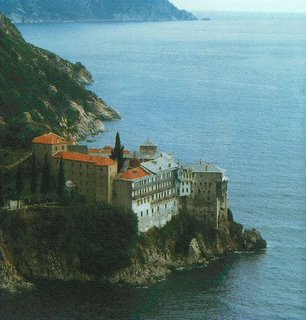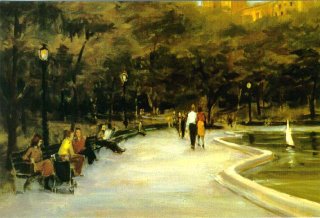
I think (maybe I'm wrong) that the mom in a family is the community builder. I remember listening to a Mars Hill tape on hospitality, and how this is a dying concept in our fragmented (or spatialized, in Catherine Pickstock's view) societies. The mother, that ideal of hospitality, comfort and the warmth of community, is now often replaced by a slick office version, who is an expert at microwave meals and would be interested in an ad such as the one I found in a California paper: "Do you need a housewife? Well, we've got 'em".
The reality is, it seems to me, that among working mothers there are two types: the educated, wealthy types, who manage things with smooth hair because they have a lot of help, and the frazzled one, who must work to help maintain a mortgage or just survival. This second type is often covering over a train wreck with saran wrap and hoping that the kids will make it somehow- thanks to the schools. The wealthy type enjoys dinner parties and guests from time to time, but really has no time for true community building and hospitality.
There is another, growing group of women: the neo-community builders, who are the true heirs to that generation (two or three ago) who knew the art and importance of hospitality and community. These are the homeschoolers, the stay-at-home moms, or the 'very part-time working' moms who somehow understand that their place is at home- but not staring out the kitchen window like some fifties manikin. They have sensed that no one, not even the TV, can replace them in the lives of their children. They understand that they have to build a culture for their children, because the culture outside is failing children, and corrupting them. They know that they have to provide safe and healthy spaces of play and work, places where their children can retain their innocence and yet learn to deal with 'the world' from a place of strength.
In this endeavor, hospitality is primary, because in order to build a healthy culture-within-a-culture, community is essential. People have to open themselves, their gifts and their homes in a more radical way, so that a community can begin to grow. However, as important as hospitality is, there is something else much more important which I have discovered in my community-building attempts (some successful, some abject failures).
I have realized a couple of things, actually: one is that women, it seems, are ill-suited in one sense to community building, and well-suited in another way. The other thing is that community building is an apostolate- and watered by prayer.
First, the suitability of women: they are highly sensitive and prone to talking. These are good and bad things, both. In being sensitive and talkative, they are showing their propensity to be experts at hospitality. Being sensitive to others' needs is the foundation of hospitality, and the beginning of community. In talking, 'word gets around' and families begin to get to know each other. The moms can help the dads and the children to understand one another, and encourage friendships between families and not just between individuals. Family friendships are the building blocks of the community, and hospitality is the mortar. The woman in a family is the primary producer of both: and if her vocation is primarily her family and home, she will pour into it not just effort and thought, but her very being.
The underside of a woman's propensity to be sensitive and to talk might be pretty obvious to anyone with any sense. The cure of it is not. I think that often the sensitive and talking issues as weaknesses are objects of fun and sterotyping, but they can actually wreck community. Gossip and grudge-holding, the bad fruits of sensitivity and talking, can destroy every tiny effort to build family friendships, choking these efforts in a tangle of weed-roots.
The Gospel commands to forgive- seventy times seven- and not to gossip, and following these commands is the practical way by which women can retain their natural propensities for good. Additionally, prayer and the understanding that community-building is an apostolate are the essential and supernatural ways by which we forgive and not give in to gossip.
An apostolate is a work which God has given a person. It is like a house built, and it must be built on Christ. It will be tested by fire, it is a work upon which we will be judged. It is also primarily Christ's, and it cannot be something that we hang on to for ourselves, no matter how big or how small it is. An apostolate must be given back to God and within it God must be given the glory, or it is built on sand.
An apostolate like community-building in all its forms, from little schools to bible groups to girl's or boy's groups, must be supported by and watered with prayer. "Pray without ceasing" the Apostle said, and we must pray while we are doing anything, any apostolate. We must pray with our willingness to forgive, to love beyond death even those whom we dislike, and with our determination to think the best of those around us and to protect their person and their reputation with our lives.
We must pray with our blessings and our goods shared, to the point of sharing what we ourselves need. We must pray with our desire to serve the other, and to see Christ in those around us. Only then will true community be built, a Christian community.
We must all of us, pray for the Christian communities in the world, those little cells of renewal, the new monasteries perched on the edge of the sea.

